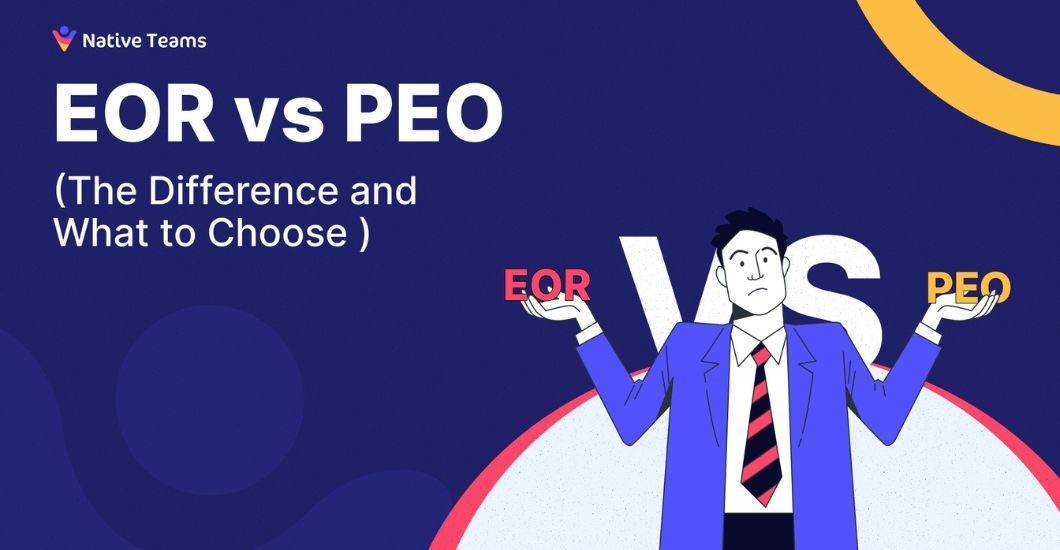EOR vs. PEO: Differences & Which One Is For You in 2025
The global talent acquisition process is quite time-consuming as it requires compliance with tax regulations and stringent labour laws.
Luckily, there are two solutions in the HR service space to help companies streamline the global hiring endeavor — employer of record (EOR) and professional employer organisation (PEO).
Understanding the key differences between EOR vs PEO can bring companies one step closer to the ideal solution for managing their global team.
Keep on reading, as we’ll cover all about EOR and PEO, their benefits, and what sets them apart.

What is an employer of record (EOR)?
An EOR is a company that functions as a legal employer for small or large-sized companies in locations where they don’t have legal entities.
The EOR company owns legal entities in different countries worldwide and uses these entities to hire international talent on behalf of the client. This is convenient for companies that want to enter foreign markets without worrying about complying with local laws and regulations.
An employer of record company typically handles the following HR functions:
- Payroll processing;
- Employee benefits administration;
- Onboarding new employees;
- Preparing employment contracts;
- Legal compliance;
- Tax management.
The EOR manages the administrative work and payroll system, while businesses can solely focus on the core of their operations. In addition, the EOR company doesn’t interfere with day-to-day tasks, giving employers full control in managing their company.
Benefits of EOR
When expanding a business on an international scale, partnering up with an employer of record provider is a sound choice. Companies can quickly access foreign markets without setting up a legal entity and dealing with bureaucracy.
EOR benefits empower businesses to grow globally with ease and confidence.
1. Fast market entry
An EOR can save companies from the hassle of establishing a legal entity. The whole process of setting up a local legal entity is quite time-consuming, and it can even take up to two years for completion.
Working with an EOR can alleviate such complexities by aiding companies to hire the best international talent while avoiding the legal rigmarole associated with creating subsidiaries. So, small businesses that lack resources to set up legal entities in new territories can benefit a lot from EOR services.
2. Full compliance
Laws related to payroll management, health insurance, and pension contributions differ significantly between countries. It can be daunting to keep track of all local laws and requirements.
Luckily, EOR providers are compliance experts who stay on top of the latest local regulations to ensure their clients comply with all legal requirements. Plus, the EOR retains full responsibility for non-compliance matters.
3. Competitive benefits packages
The competitive benefits packages awarded to employees must be in alignment with the local labour laws. An international EOR can help in creating a benefits package that suits the employees’ needs and deliver it in a specific timeframe.
Moreover, small businesses could encounter obstacles when accessing insurance packages on behalf of their employees. An employer of record provider can easily register with pension funds and other providers for benefits.
4. Avoid employee misclassification
EOR companies can be of use to businesses and industries where workers would be illegally classified as contractors rather than employees. Misclassification can result in serious financial penalties and liabilities.
When employees are hired through EOR’s legal entities, they are naturally classified as bona fide employees. This reduces the risk of employee misclassification and guarantees compliance.

What is a professional employer organisation (PEO)?
Professional employer organisation (PEO) is a company that acts as a co-employer and provides HR services for companies that want to outsource these operations.
PEOs assist businesses in compliantly hiring full-time workers around the globe and simplifying the payroll process. In addition, the client company that is in an arrangement with a PEO company holds the decision-making power for employees’ workload, projects, and salaries.
PEO companies usually provide the following HR services:
- Payroll processing;
- Full legal compliance;
- Employee benefits packages;
- Onboarding new employees;
- Preparing employment contracts;
- Tax management.
Similarly to EOR providers, professional employer organisation companies offload HR-related tasks so that internal teams can fixate their attention on core tasks.
Benefits of PEO
PEO companies offer an array of benefits to businesses that want to share the burden of administrative tasks. They alleviate the stress that comes with HR compliance issues and ensure a solid recruiting process.
This section will outline some of the numerous benefits that PEOs can provide.
1. Improved employee benefits
Attracting and retaining the best talent can be an uphill battle if companies don’t offer competitive salaries and benefits. Because PEOs co-employ a large number of workers, they can access robust benefits at affordable rates.
PEOs usually provide healthcare plans, retirement plans, mental health support, worksite benefits, and commuter benefits. They can also aid the company’s staff to fully grasp their benefits and implement them.
2. Save time and money
Handling paperwork, negotiating with benefits providers, and staying compliant with the latest local laws can take up considerable amounts of time. PEOs free up a lot of time by taking these mundane HR administration tasks off the company’s plate.
In addition to the time-saving benefits, PEOs are also cost-effective as they use the existing infrastructure to obtain the best prices from many benefits providers.
3. Maintain compliance
Failing to comply with local employment laws could lead to costly penalties. Professional employer organisations stay on top of the ever-changing laws and regulations, giving companies peace of mind.
PEOs typically have compliance experts that track employee-related laws and ensure payroll, benefits, and labour compliance. This assists businesses in making appropriate adjustments with regulatory updates.
4. Legal support
With the aid of PEOs, companies can mitigate legal expenses that come with lawsuits. PEOs help companies to tap into the pool of experts that are well-versed in the complexities of discrimination laws.
Furthermore, PEOs remain liable for certain employment claims, like wrongful termination. However, this service isn’t a substitute for legal counsel. It merely serves as an extra layer of defense to warn companies against potential lawsuits.

Key differences between EORs and PEOs
Payroll processing, employee benefits, and full compliance — these are some benefits that both EOR and PEO providers offer. However, there are some distinctions in the way they function.
Here are the major points that separate these two HR arrangements.
Legal entity requirements
One of the main differences is that EOR providers allow branching out to new territories without having to set up a legal entity in every location. New hires are registered as employees under the EOR’s local legal entity.
On the other hand, a PEO provider requires companies to have a legal entity in the country where they want to expand. So, PEO services are better suited for businesses that own or looking to establish local legal entities and outsource their HR operations.
Employee-service provider relationship
When hiring employees worldwide through EOR, the employer of record providers is the official legal employer of the distributed workforce. A PEO only acts as a co-employer, while the company retains the role of legal employer.
This means that legal liabilities related to the employment agreement are shared between the PEO and the client. With an employer of record arrangement, the EOR assumes full responsibility for the risks and liabilities associated with its services.
Type of employment
The structural differences between EOR vs PEO dictate the company’s growth scale. PEO’s co-employment arrangements bring more value to companies aiming to hire full-time employees over independent contractors.
An EOR will be more beneficial for companies that prefer to hire seasonal employees, part-time, or independent contractors. Since EOR providers fully understand the local labour laws, they will ease the side effects of having temporary employees.
Different cost
EORs and PEOs have a similar charging structure, either as a monthly fee per employee or as a percentage of the company’s monthly payroll. Some PEOs might require an introductory charge to begin using their services.
However, EORs often cost less than PEOs. This is because EOR providers cover employees’ benefits and insurance plans, saving companies a significant amount of money. Native Teams offers various prices for these services, so make sure to check out the pricing page to find the best offer for you!
Does your business need an EOR or a PEO?
EOR and PEO assist in the transitional process for expanding overseas. However, both provide different values to businesses. EOR providers will be a great fit for businesses looking to expand their operations internationally without having a legal entity. If a company already has a legal entity, they can hire PEO as a co-employer to handle all HR tasks.
Moreover, PEO can help businesses hire full-time employees and handle everything from onboarding to managing taxes. With EOR, companies can outsource only part of their HR tasks, like hiring seasonal employees on the company’s behalf.

Wrapping up
Determining the right service requires an in-depth analysis of the company’s current and future strategy. Both EOR and PEO are instrumental when entering new markets. However, the main difference lies in the requirement for a local legal entity. Knowing the above-mentioned differences can help businesses choose quickly and scale with all the legal requirements.
